雪莱无神论必要性中英文
- 格式:doc
- 大小:53.50 KB
- 文档页数:9
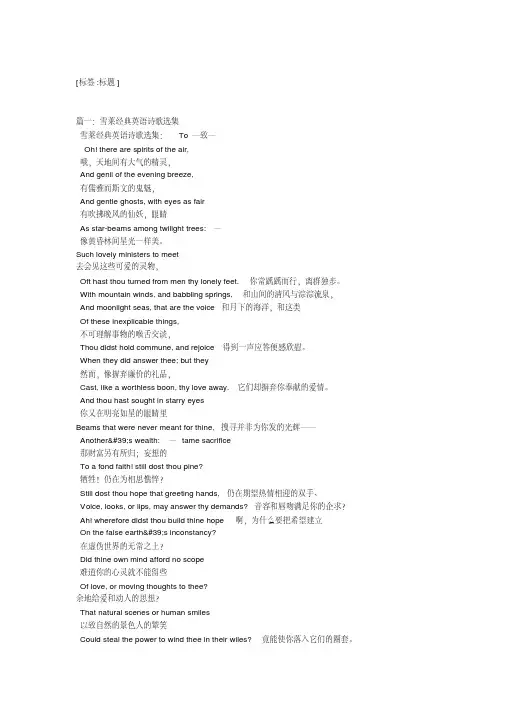
[标签:标题]篇一:雪莱经典英语诗歌选集雪莱经典英语诗歌选集:To —致—Oh! there are spirits of the air,哦,天地间有大气的精灵,And genii of the evening breeze,有儒雅而斯文的鬼魅,And gentle ghosts, with eyes as fair有吹拂晚风的仙妖,眼睛As star-beams among twilight trees: —像黄昏林间星光一样美。
Such lovely ministers to meet去会见这些可爱的灵物,Oft hast thou turned from men thy lonely feet. 你常踽踽而行,离群独步。
With mountain winds, and babbling springs, 和山间的清风与淙淙流泉,And moonlight seas, that are the voice 和月下的海洋,和这类Of these inexplicable things,不可理解事物的喉舌交谈,Thou didst hold commune, and rejoice 得到一声应答便感欣慰。
When they did answer thee; but they然而,像摒弃廉价的礼品,Cast, like a worthless boon, thy love away. 它们却摒弃你奉献的爱情。
And thou hast sought in starry eyes你又在明亮如星的眼睛里Beams that were never meant for thine, 搜寻并非为你发的光辉——Another's wealth: —tame sacrifice那财富另有所归;妄想的To a fond faith! still dost thou pine?牺牲!仍在为相思憔悴?Still dost thou hope that greeting hands, 仍在期望热情相迎的双手、Voice, looks, or lips, may answer thy demands? 音容和唇吻满足你的企求?Ah! wherefore didst thou build thine hope 啊,为什么要把希望建立On the false earth's inconstancy?在虚伪世界的无常之上?Did thine own mind afford no scope难道你的心灵就不能留些Of love, or moving thoughts to thee?余地给爱和动人的思想?That natural scenes or human smiles以致自然的景色人的颦笑Could steal the power to wind thee in their wiles? 竟能使你落入它们的圈套。
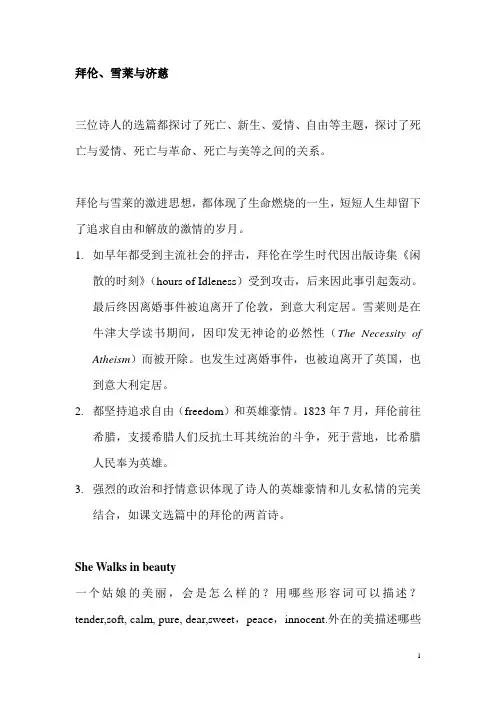
拜伦、雪莱与济慈三位诗人的选篇都探讨了死亡、新生、爱情、自由等主题,探讨了死亡与爱情、死亡与革命、死亡与美等之间的关系。
拜伦与雪莱的激进思想,都体现了生命燃烧的一生,短短人生却留下了追求自由和解放的激情的岁月。
1.如早年都受到主流社会的抨击,拜伦在学生时代因出版诗集《闲散的时刻》(hours of Idleness)受到攻击,后来因此事引起轰动。
最后终因离婚事件被迫离开了伦敦,到意大利定居。
雪莱则是在牛津大学读书期间,因印发无神论的必然性(The Necessity of Atheism)而被开除。
也发生过离婚事件,也被迫离开了英国,也到意大利定居。
2.都坚持追求自由(freedom)和英雄豪情。
1823年7月,拜伦前往希腊,支援希腊人们反抗土耳其统治的斗争,死于营地,比希腊人民奉为英雄。
3.强烈的政治和抒情意识体现了诗人的英雄豪情和儿女私情的完美结合,如课文选篇中的拜伦的两首诗。
She Walks in beauty一个姑娘的美丽,会是怎么样的?用哪些形容词可以描述?tender,soft, calm, pure, dear,sweet,peace,innocent.外在的美描述哪些部位?如眼睛(eye),头发(raven tress)(色调),脸庞(色调)(face),面颊(cheek),额际(brow),微笑(smile),容颜(aspect),心灵(peace)(mind and heart)1.What is the word as the central image of the second part of thepoem?2.Would you like to analyze the syntactic structure of part 2?3.The body narrative is apparent in this poem, so how do you thinkbody parts(what are they?) are narrated by Byron?4.除了对有形身体(body parts)的叙述,还有就是对无形的身体叙述。
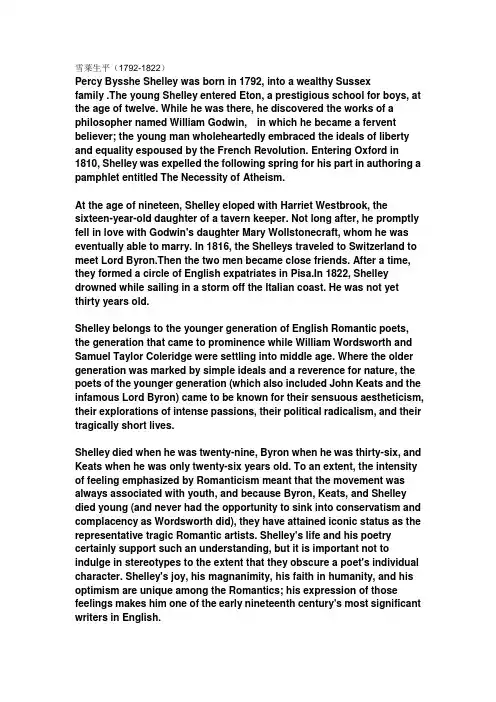
雪莱生平(1792-1822)Percy Bysshe Shelley was born in 1792, into a wealthy Sussexfamily .The young Shelley entered Eton, a prestigious school for boys, at the age of twelve. While he was there, he discovered the works of a philosopher named William Godwin, in which he became a fervent believer; the young man wholeheartedly embraced the ideals of liberty and equality espoused by the French Revolution. Entering Oxford in 1810, Shelley was expelled the following spring for his part in authoring a pamphlet entitled The Necessity of Atheism.At the age of nineteen, Shelley eloped with Harriet Westbrook, the sixteen-year-old daughter of a tavern keeper. Not long after, he promptly fell in love with Godwin's daughter Mary Wollstonecraft, whom he was eventually able to marry. In 1816, the Shelleys traveled to Switzerland to meet Lord Byron.Then the two men became close friends. After a time, they formed a circle of English expatriates in Pisa.In 1822, Shelley drowned while sailing in a storm off the Italian coast. He was not yet thirty years old.Shelley belongs to the younger generation of English Romantic poets, the generation that came to prominence while William Wordsworth and Samuel Taylor Coleridge were settling into middle age. Where the older generation was marked by simple ideals and a reverence for nature, the poets of the younger generation (which also included John Keats and the infamous Lord Byron) came to be known for their sensuous aestheticism, their explorations of intense passions, their political radicalism, and their tragically short lives.Shelley died when he was twenty-nine, Byron when he was thirty-six, and Keats when he was only twenty-six years old. To an extent, the intensity of feeling emphasized by Romanticism meant that the movement was always associated with youth, and because Byron, Keats, and Shelley died young (and never had the opportunity to sink into conservatism and complacency as Wordsworth did), they have attained iconic status as the representative tragic Romantic artists. Shelley's life and his poetry certainly support such an understanding, but it is important not to indulge in stereotypes to the extent that they obscure a poet's individual character. Shelley's joy, his magnanimity, his faith in humanity, and his optimism are unique among the Romantics; his expression of those feelings makes him one of the early nineteenth century's most significant writers in English.雪莱,(Percy Bysshe Shelley,1792~1822)英国著名民主诗人。
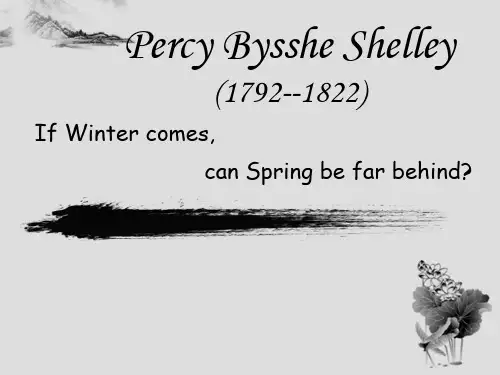
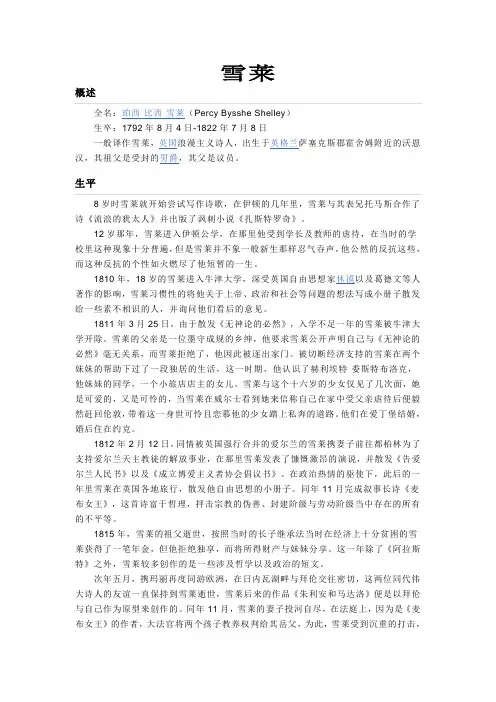
雪莱概述全名:珀西·比西·雪莱(Percy Bysshe Shelley)生卒:1792年8月4日-1822年7月8日一般译作雪莱,英国浪漫主义诗人,出生于英格兰萨塞克斯郡霍舍姆附近的沃恩汉,其祖父是受封的男爵,其父是议员。
生平8岁时雪莱就开始尝试写作诗歌,在伊顿的几年里,雪莱与其表兄托马斯合作了诗《流浪的犹太人》并出版了讽刺小说《扎斯特罗奇》。
12岁那年,雪莱进入伊顿公学,在那里他受到学长及教师的虐待,在当时的学校里这种现象十分普遍,但是雪莱并不象一般新生那样忍气吞声,他公然的反抗这些,而这种反抗的个性如火燃尽了他短暂的一生。
1810年,18岁的雪莱进入牛津大学,深受英国自由思想家休谟以及葛德文等人著作的影响,雪莱习惯性的将他关于上帝、政治和社会等问题的想法写成小册子散发给一些素不相识的人,并询问他们看后的意见。
1811年3月25日,由于散发《无神论的必然》,入学不足一年的雪莱被牛津大学开除。
雪莱的父亲是一位墨守成规的乡绅,他要求雪莱公开声明自己与《无神论的必然》毫无关系,而雪莱拒绝了,他因此被逐出家门。
被切断经济支持的雪莱在两个妹妹的帮助下过了一段独居的生活,这一时期,他认识了赫利埃特·委斯特布洛克,他妹妹的同学,一个小旅店店主的女儿。
雪莱与这个十六岁的少女仅见了几次面,她是可爱的,又是可怜的,当雪莱在威尔士看到她来信称自己在家中受父亲虐待后便毅然赶回伦敦,带着这一身世可怜且恋慕他的少女踏上私奔的道路。
他们在爱丁堡结婚,婚后住在约克。
1812年2月12日,同情被英国强行合并的爱尔兰的雪莱携妻子前往都柏林为了支持爱尔兰天主教徒的解放事业,在那里雪莱发表了慷慨激昂的演说,并散发《告爱尔兰人民书》以及《成立博爱主义者协会倡议书》。
在政治热情的驱使下,此后的一年里雪莱在英国各地旅行,散发他自由思想的小册子。
同年11月完成叙事长诗《麦布女王》,这首诗富于哲理,抨击宗教的伪善、封建阶级与劳动阶级当中存在的所有的不平等。
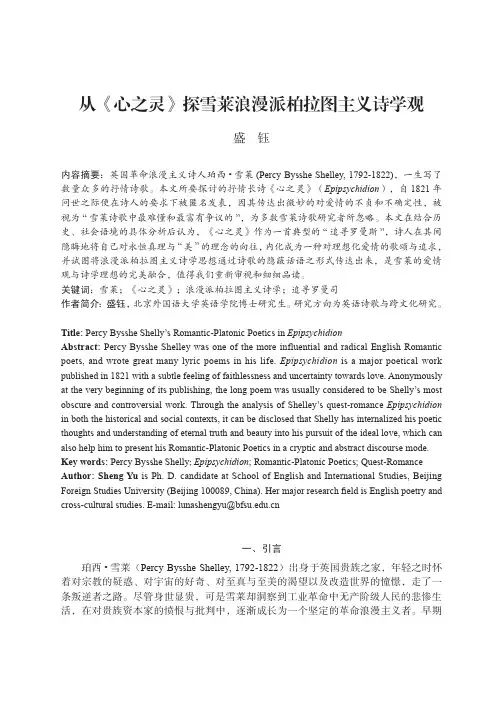
从《心之灵》探雪莱浪漫派柏拉图主义诗学观盛 钰内容摘要:英国革命浪漫主义诗人珀西•雪莱(Percy Bysshe Shelley, 1792-1822),一生写了数量众多的抒情诗歌。
本文所要探讨的抒情长诗《心之灵》(Epipsychidion),自1821年问世之际便在诗人的要求下被匿名发表,因其传达出微妙的对爱情的不贞和不确定性,被视为“雪莱诗歌中最难懂和最富有争议的”,为多数雪莱诗歌研究者所忽略。
本文在结合历史、社会语境的具体分析后认为,《心之灵》作为一首典型的“追寻罗曼斯”,诗人在其间隐晦地将自己对永恒真理与“美”的理念的向往,内化成为一种对理想化爱情的歌颂与追求,并试图将浪漫派柏拉图主义诗学思想通过诗歌的隐蔽话语之形式传达出来,是雪莱的爱情观与诗学理想的完美融合,值得我们重新审视和细细品读。
关键词:雪莱;《心之灵》;浪漫派柏拉图主义诗学;追寻罗曼司作者简介:盛钰,北京外国语大学英语学院博士研究生。
研究方向为英语诗歌与跨文化研究。
Title: Percy Bysshe Shelly’s Romantic-Platonic Poetics in EpipsychidionAbstract: Percy Bysshe Shelley was one of the more influential and radical English Romantic poets, and wrote great many lyric poems in his life. Epipsychidion is a major poetical work published in 1821 with a subtle feeling of faithlessness and uncertainty towards love. Anonymously at the very beginning of its publishing, the long poem was usually considered to be Shelly’s most obscure and controversial work. Through the analysis of Shelley’s quest-romance Epipsychidion in both the historical and social contexts, it can be disclosed that Shelly has internalized his poetic thoughts and understanding of eternal truth and beauty into his pursuit of the ideal love, which can also help him to present his Romantic-Platonic Poetics in a cryptic and abstract discourse mode. Key words: Percy Bysshe Shelly; Epipsychidion; Romantic-Platonic Poetics; Quest-Romance Author: Sheng Yu is Ph. D. candidate at School of English and International Studies, Beijing Foreign Studies University (Beijing 100089, China). Her major research field is English poetry and cross-culturalstudies.E-mail:********************.cn一、引言珀西•雪莱(Percy Bysshe Shelley, 1792-1822)出身于英国贵族之家,年轻之时怀着对宗教的疑惑、对宇宙的好奇、对至真与至美的渴望以及改造世界的憧憬,走了一条叛逆者之路。
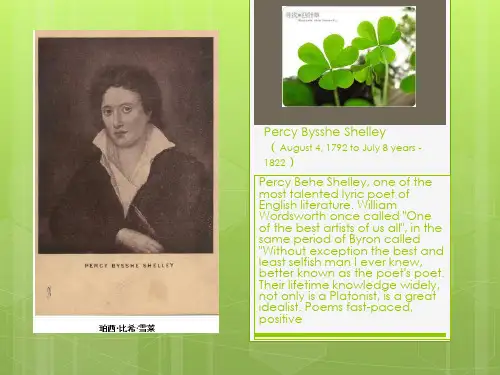
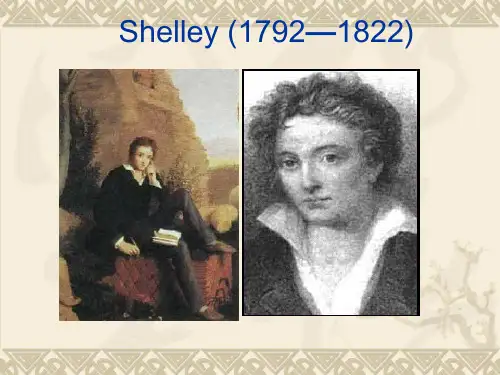
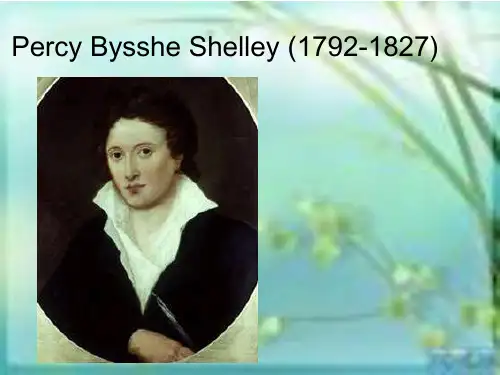

![[新版]积极消极浪漫主义诗人和名言](https://uimg.taocdn.com/70651d5dc950ad02de80d4d8d15abe23482f038a.webp)
积极消极浪漫主义诗人和名言雪莱的Once I belonged to azrael , but the future will belongs to me .过去属于死神,未来属于你自己。
冬天已经到来,春天还会远吗?原文:If winter comes, can spring be far behind?萧伯纳的Behind every successful man, there is a woman and behind every unsuccessful man, there are two. --Bernard Shaw每个成功男人的背后总有一个女人,而不成功的呢?有两个。
I was born intelligent - education ruined me.没受教育以前,我很聪明的,一上学就毁了。
Practice makes perfect..... But nobodys perfect...... so why practice? 他们说,完美是练出来的,但没有人是完美的呀,那我们还练习什么?If it is true that we are here to help others, then what exactly are the others here for? 如果我们活着是为了帮助他人,那他们还有什么活头?Since light travels faster than sound, people appear bright until you hear them speak. --Bernard Shaw因为光比声音传播得快,所以没说话以前,各个都光鲜亮丽的。
Money is not everything. There is Mastercard & Visa.眼里不能只有钱,你让信用卡情何以堪啊。
One should love animals. They are so tasty. 一个人应该打从心底热爱动物。
雪莱名言语录英文范文一:As a student, I have been inspired by the many famous quotes and sayings of Percy Bysshe Shelley, a celebrated English poet of the Romantic era. Shelley's words have given me comfort during difficult times and have motivated me to keep trying even when faced with adversity. Below are some of my favorite quotes by him and the reason why they are important to me.One of my favorite quotes by Shelley is, "If Winter comes, can Spring be far behind?" This quote, which comes from his poem "Ode to the West Wind," reminds me that no matter how difficult a situation might seem, there is always hope for a better tomorrow. Whenever I feel overwhelmed or discouraged, I remind myself of these words and find the strength to keep going.Another quote by Shelley that has resonated with me is, "Life, like a dome of many colored glass, stains the white radiance of eternity." This quote speaks to the idea that our everyday experiences, no matter how small or insignificant they may seem, shape our understanding of the world around us. It reminds me to appreciate all the small things in life and to find joy in the present moment.Finally, one of the most famous quotes by Shelley is, "We are all Greeks. Our laws, our literature, our religion, our arts have their root in Greece." In this quote, Shelley celebrates the enduring legacy of Greek culture and its influence on Western civilization. As a student of literature and history, this quote has beenparticularly inspiring to me, as it highlights the importance of studying and preserving the cultural heritage that has shaped our world.In conclusion, Percy Bysshe Shelley's words have been a constant source of inspiration for me as a student. From reminding me ofthe power of hope to embracing the beauty of the present moment, his quotes have helped me to better understand the world aroundme and my place in it.要点分析:1. 介绍文中重点关注的人物:Percy Bysshe Shelley2. 分析为什么他的名言语录对学生如此重要:激励人继续努力,提醒学生珍惜生活的点滴,强调希腊文化对西方文化的影响3. 突出3个Shelley的名言语录,总结他的思想和教诲。
雪莱的名言名句英文回答:I am Percy Bysshe Shelley, a Romantic poet of the 19th century, and here are some of my most famous quotes:"Our sweetest songs are those that tell of saddest thought.""The world's great men have not commonly been great scholars, nor its great scholars great men.""Poets are the unacknowledged legislators of the world.""Love is like an ocean, that has no bound; it is like the skies, that have no end.""The only way to deal with an unfree world is to become so absolutely free that your very existence is anact of rebellion.""The imagination is the great instrument of mankind, and is the basis of all progress.""If Winter comes, can Spring be far behind?""He has outsoared the shadow of our night; enmity and truth and peace and love exist but in his light.""I fall upon the thorns of life, I bleed."These quotes reflect my beliefs about love, society, and the power of imagination. I hope they inspire and resonate with you as they have with others for centuries.中文回答:大家好,我是19世纪的浪漫主义诗人珀西·比希·雪莱,我的一些名言名句有:"我们最动人的歌声,往往诉说着最悲伤的思绪。
雪莱的名言名句英文回答:As one of the most celebrated Romantic poets, Percy Bysshe Shelley has left an indelible mark on English literature with his revolutionary ideas and evocative imagery. Throughout his literary career, Shelley penned numerous quotes and aphorisms that continue to inspire and resonate with readers worldwide.One of Shelley's most famous quotations encapsulates his belief in the power of the human spirit and the pursuit of knowledge:> "Nothing of him that doth fade, but doth suffer a sea change into something rich and strange."This line, from Shelley's poem "The Tempest," speaks to the transformative power of experience and adversity. The "sea change" he describes is a metaphor for the profoundalterations that can occur within us as we navigate life's challenges. Like the common objects that undergo a remarkable transformation when submerged in the ocean, our own trials and tribulations can shape us into something entirely new and extraordinary.Another of Shelley's well-known quotes highlights the importance of empathy and compassion:> "The best and happiest moments in the lives of most men are those which they would give, and do give, for the happiness of others."This observation underscores the profound satisfaction that comes from acts of kindness and selflessness. Shelley believed that true happiness lies not in the pursuit of personal gain but in the ability to uplift and support those around us. By extending our love and compassion to others, we not only make a meaningful impact on their lives but also enrich our own.Shelley's influence extends beyond the realm of poetryinto the wider sphere of social and political discourse.His revolutionary spirit and unwavering belief in the power of human reason are evident in many of his most famous quotes:> "If ignorance of a fact be an excuse for committing a fault, what shall be the excuse for committing a fault when the fact is known?"This powerful statement underscores the importance of accountability and responsibility. Shelley believed that individuals cannot excuse their actions based on ignoranceor lack of knowledge. True morality, he argued, requires us to be aware of our actions and their potential consequences.Another of Shelley's political quotes encapsulates his belief in the power of nonviolent resistance:> "The man of virtuous soul commands not, nor obeys power within his soul."This line, from Shelley's poem "Prometheus Unbound,"speaks to the enduring power of the individual conscience in the face of tyranny and oppression. Shelley believedthat true freedom lies not in submitting to external authority but in cultivating inner strength and moral rectitude.Shelley's quotes and aphorisms continue to resonate with readers today, offering timeless insights into the human condition, the pursuit of knowledge, and the struggle for social justice. His words inspire us to challenge conventional wisdom, embrace compassion, and strive for a world where reason, empathy, and freedom prevail.中文回答:作为最著名的浪漫主义诗人之一,珀西·比希·雪莱以其革命性的思想和动人意象在英国文学史上留下了不可磨灭的印记。
The flower that smiles today Tomorrow dies;All that we wish to say Tempts and then flies.What is this world’s delight? Lightning that mocks the night. Brief even as bright.今天微笑的花朵明日它便死去;我们但愿留驻的诱惑之后飞去。
人世间快乐究为何物?恰如闪电嘲笑黑夜,光亮一片,转瞬消逝。
Virtue, how frail it is! Friendship how rare!Love, how it sells poor blissFor proud despair!But we,though soon they fall, Survive their joy, and allWhich ours we call.美德何其脆弱!友谊何其稀有!爱情以不足道的幸福轻易换取高傲的绝望!它们很快跌落,而我们活下去,再没有它们带来的欢乐,没有我们称为“我们的”一切。
Whilst skies are blue and bright, Whilst flowers are gay,Whilst eyes that change ere nightMake glad the day;Whilst yet the calm hours creep Dream thou and from thy sleep Then wake up to weep.趁天空还蔚蓝光明趁花朵还娇艳芳菲,趁黑夜未到,眼睛能看到白日的美好,趁平静还在缓缓流淌,入梦吧,待从梦中醒来再哭泣。
雪莱致云雀(中英文)To a Skylark by Percy Bysshe Shelley雪莱致云雀Hail to thee, blithe Spirit!Bird thou never wert,That from Heaven, or near it,Pourest thy full heartIn profuse strains of unpremeditated art.Higher still and higherFrom the earth thou springestLike a cloud of fire;The blue deep thou wingest,And singing still dost soar, and soaring ever singest.In the golden lightningOf the sunken sunO'er which clouds are bright'ning,Thou dost float and run,Like an unbodied joy whose race is just begun.The pale purple evenMelts around thy flight;Like a star of HeavenIn the broad daylightThou art unseen, but yet I hear thy shrill delight:Keen as are the arrowsOf that silver sphere,Whose intense lamp narrowsIn the white dawn clearUntil we hardly see--we feel that it is there.All the earth and airWith thy voice is loud.As, when night is bare,From one lonely cloudThe moon rains out her beams, and heaven is overflowed.What thou art we know not;What is most like thee?From rainbow clouds there flow notDrops so bright to seeAs from thy presence showers a rain of melody.Like a poet hiddenIn the light of thought,Singing hymns unbidden,Till the world is wroughtTo sympathy with hopes and fears it heeded not:Like a high-born maidenIn a palace tower,Soothing her love-ladenSoul in secret hourWith music sweet as love, which overflows her bower: Like a glow-worm goldenIn a dell of dew,Scattering unbeholdenIts aerial hueAmong the flowers and grass, which screen it from the view: Like a rose emboweredIn its own green leaves,By warm winds deflowered,Till the scent it givesMakes faint with too much sweet these heavy-winged thieves.Sound of vernal showersOn the twinkling grass,Rain-awakened flowers,All that ever wasJoyous, and clear, and fresh, thy music doth surpass.Teach us, sprite or bird,What sweet thoughts are thine:I have never heardPraise of love or wineThat panted forth a flood of rapture so divine.Chorus hymenealOr triumphal chauntMatched with thine, would be allBut an empty vaunt--A thing wherein we feel there is some hidden want.What objects are the fountainsWhat fields, or waves, or mountains?What shapes of sky or plain?What love of thine own kind? what ignorance of pain?With thy clear keen joyanceLanguor cannot be:Shadow of annoyanceNever came near thee:Thou lovest, but ne'er knew love's sad satiety.Waking or asleep,Thou of death must deemThings more true and deepThan we mortals dream,Or how could thy notes flow in such a crystal stream?We look before and after,And pine for what is not:Our sincerest laughterWith some pain is fraught;Our sweetest songs are those that tell of saddest thought.Yet if we could scornHate, and pride, and fear;If we were things bornI know not how thy joy we ever should come near.Better than all measuresOf delightful sound,Better than all treasuresThat in books are found,Thy skill to poet were, thou scorner of the ground!Teach me half the gladnessThat thy brain must know,Such harmonious madnessFrom my lips would flowThe world should listen then, as I am listening now! 致云雀你好, 欢乐的精灵!你压根儿不像飞鸟,你从天堂或天堂附近毫不吝惜地倾倒如同行云流水一般的心灵的曲调。
雪莱的名言名句英文回答:As a prolific poet and Romantic icon, Percy Bysshe Shelley penned numerous timeless lines that have resonated with generations of readers. His poetry, marked by its lyrical beauty, revolutionary fervor, and philosophical depth, has left an enduring legacy on the literary landscape.One of Shelley's most famous quotes is: "If Winter comes, can Spring be far behind?" This evocative line, from his poem "Ode to the West Wind," speaks to the cyclical nature of life and the inevitability of change. It suggests that even in the darkest of times, hope and renewal are always on the horizon.Another enduring quotation from Shelley is: "The best and happiest moments of life are those which are not prepared, but stumble upon us." This spontaneous andserendipitous nature of life's most precious moments is a theme that runs through much of Shelley's work. It emphasizes the importance of embracing spontaneity andbeing open to unexpected joys.Shelley's poetry is also known for its passionate defense of liberty and justice. He famously wrote: "The man who is not willing to sacrifice his life for his liberty,is unworthy of either liberty or life." This bold statement reflects Shelley's unwavering belief in the importance of individual freedom and the right to self-determination.In "Ozymandias," one of his most famous sonnets,Shelley explores the transience of power and the futilityof human ambition. The poem's most iconic lines are: "Look on my works, ye Mighty, and despair! Nothing beside remains. Round the decay/ Of that colossal wreck, boundless andbare/ The lone and level sands stretch far away." Theselines serve as a poignant reminder of the ephemeral natureof worldly achievements and the ultimate insignificance of human power in the face of time.Shelley's poetry is a treasure trove of quotable gemsthat continue to inspire, challenge, and resonate with readers today. His words have the power to captivate,provoke thought, and stir the soul.中文回答:作为一个多产的诗人和浪漫主义偶像,珀西·比希·雪莱写下了许多名垂千古的名句,这些名句引起了几代读者的共鸣。
雪莱的墓志铭(最新版)编制人:__________________审核人:__________________审批人:__________________编制单位:__________________编制时间:____年____月____日序言下载提示:该文档是本店铺精心编制而成的,希望大家下载后,能够帮助大家解决实际问题。
文档下载后可定制修改,请根据实际需要进行调整和使用,谢谢!并且,本店铺为大家提供各种类型的经典范文,如故事大全、作文大全、教案大全、游戏大全、句子大全、诗词大全、家庭教育、幼儿教育、小学教育、其他范文等等,想了解不同范文格式和写法,敬请关注!Download tips: This document is carefully compiled by this editor.I hope that after you download it, it can help you solve practical problems. The document can be customized and modified after downloading, please adjust and use it according to actual needs, thank you!In addition, this store provides various types of classic sample essays, such as stories, composition, lesson plans, games, sentences, poems, family education, early childhood education, primary education, other models, etc. If you want to know the difference Please pay attention to the format and writing of the sample essay!雪莱的墓志铭波西•比希•雪莱(1792—1822),英国浪漫主义诗人。
(此文即是雪莱19岁时遭牛津开除之作)对真理的爱是促使作者写这篇短论的唯一动机。
因此,如果有的读者发现作者在推理上有任何缺陷,或者能够提出作者的心灵永远发现不了的证据,作者恳切地请求他们以同样扼要、同样严格和同样坦率的方式,发表他们的论据以及反对意见。
由于〔有神论的〕证据不足,本文作者是:一个无神论者。
严密地检验支持任何命题的证明是否有效,是获得真理的唯一可靠方法;关于这种方法的优点,是不需要多说的。
我们关于上帝存在的知识;是一个极其重要的论题;无论怎样细致的研究,也决不会是过分的。
就是根据这一认识,我们现在扼要地、无所偏袒地考察一下那些已经提出了的证明。
我们首先必须考虑什么是信仰的本质。
当一个命题出现在心灵面前时,心灵就对构成这一命题的观念,产生同意或不同意的感觉。
对于这些观念感到同意,就称为相信,有许多障碍往往阻止心灵产生这种直接的感觉;心灵就企图消除这类障碍,以便使这种感觉显得清晰。
心灵为了对于构成命题的诸观念间的关系有完整的感觉,而对它们进行研究,这种研究是主动的;但是心灵对于这些观念间的关系的感觉,却是被动的。
由于把心灵的这种研究和感觉混淆起来的缘故,就使许多人错误地以为心灵在信仰上是主动的,认为信仰是一种意志的活动,其结论就成为:信仰可以受心灵的制约。
他们由于坚执着这种错误的观点,就进一步使不信仰带有一定程度的罪恶性质;但按不信仰的本质来说,是不可能带有罪恶性质的;它也同样不可能带有善的性质。
因此,信仰是一种感情,这种感情的力量,就同其他各种感情一样,恰好同激动的程度成正比。
激动的程度有三种。
感觉是心灵获得一切知识的源泉;因而感觉的证据使人产生最强烈的同意。
心灵的判断是建立在我们亲身经验的基础之上的,这种经验来自感觉的源泉;因此,根据经验的判断,在激动的程度上属于第二等。
他人的经验,传达到我们的经验中,那就属于程度最低的一种(可以制订一种在程度上逐步增加的标尺,其上可以标明各种命题经受感觉考查的不同能力,命题的这种能力,将能准确地表明它们应该得到的信仰的程度。
)因此,凡是有违理性的一切证明,都是不能接受的;因为理性就建立在感觉的证据上。
每一种证明都可以被归人上述这三类中的一类;我们要考虑这三类的论据中,有哪一个论据足以说服我们相信上帝的存在。
第一类,感觉上的证据。
如果上帝能在我们面前现身,如果他能以他的存在来说服我们的感觉,这种启示就必然能造成信仰。
如果神在哪些人面前出现过了,那么,这些人就可能具有对他的存在的最强烈的信念。
但是神学家们的上帝是谁也看不见的。
第二类,理性。
不能不认为,人们都知道:一切现存之物必然有其起源,或者亘古即有之;人们也知道,凡不是亘古即有的事物,都必然有其产生的原因。
当这种论点用到宇宙上去,就必须证明宇宙是被创造出来的;除非清楚地阐明我们可以合理地假定宇宙是无始无终的。
我们必须首先证明有一个设计,然后才能推论出有这么一个设计者。
唯一使我们可以形成因果关系的思想,来自事物间的经常联系,从一事物推出另一事物的关系。
在两个命题正好相反的情况下,心灵就相信比较好理解的一个;与其认为宇宙之外另有一个存在,这个存在能够创造宇宙,还不如假定宇宙是无始无终的存在为易解。
如果心灵已被一种担负压得够沉重的时候,再去增加不能忍受的重量,这会是一种缓解吗?另外一种论据是建立在人对其自身存在的知炽上的,大致如下:一个人不仅知道他现在存在,而且也知道他最初并不存在;因此,必然有其原因。
但是,我们的因果观念只能来源于客观事物的恒常的联结,以及由此及彼的推理;而且,我们在实验地进行推理时,只能从结果推论出恰好适合于此种结果的那些原因。
但是确有某种工具产生原动力,可是我们不能证明这种原动力是这些工具所固有的;相反的假设也同样没法阐明;我们承认这种原动力是不可理解的;但是如果假设这种结果是由一个永恒的、无处不在的、全能的存在所产生,也使原因变得同样模糊,而且使它更不好理解。
第三类,见证。
见证决不能违反理性。
上帝使人的感觉相信他是存在的,关于这一点的见证,如果要人承认的话,除非我们的心灵认为这些见证人见到上帝的可能大于他们受骗的可能。
我们的理性永不可能承认这样一些人的见证,他们不仅宣布他们是奇迹的目击者,并且也宣布上帝是非理性的;怎么说他们宣布上帝为非理性的?因为上帝指挥着,要人们相信他,谁相信他,他就给谁以最高的奖赏,谁不信他,就永世受罚。
我们只能指挥有意识的行动;但信仰并非有意识的行动;心灵是被动的,或者说无意识地主动的:由此可见,我们没有足够的证据,或者不如说,要证明上帝的存在,证据不足。
我们在上文已表明,从理性不能演绎出这种结论。
只有那些被感觉的证据所说服的人们,才能相信其存在。
因此,很显然,从这三类信仰的源泉都得到证明,心灵不能相信有一个创造一切的上帝的存在。
同样明显的是,信仰既然是一种心灵的感情,对于不信者,即无罪恶可言;只有那些不愿消除错误观点,始终从这种观点来看待任何论题的人,才是不可恕的。
每一颗能思考的心灵,必然承认关于上帝的存在世上没有任何证明。
上帝只是一个假设,作为一个假设,因此需要证明。
“有责证明”(musprobandi),对有神论者们来说。
艾萨克·牛顿爵士说:“我从来也不作假设,因为任何不是从现象中演绎出来的东西,都必须被称为‘假设’;凡是假设,不论是形而上学的假设,物理学的假设,或带有神秘性质的假设,甚而至于力学上的假设——从哲学上说来;统统都是不值一钱的。
” 牛顿的这一条有价值的法则,也适合于一切关于创造主的存在的证明。
我们看到具有各种力量的各种物体,我们仅仅知道它们的效果;关于它们的本质和原因,我们处于一种无知的状态。
牛顿称这些为事物的现象;但是哲学的骄做不愿意承认哲学自己对于这些事物的原因无知。
从我们的感觉对象——这些现象,我们企图推出原因,这个原因我们称之为上帝,又无谓地赠给他各种否定的和矛盾的性质。
从这个假设出发,我们发明了这个总的名称〔上帝〕,来掩饰我们对原因和本质的无知。
被称为上帝的这个存在,根本不符合牛顿所开列的条件;上帝却带有哲学自大狂所织成的帷幕的一切特征,这片帷幕被哲学家们用来甚至让他们自己看不到自己的无知。
他们从庸人们的“神人同形同性论”中借取了纺织这片帷幕所需的纱线。
诡辩家们为了同样目的,使用了种种的字眼:从逍遥学派的神秘性概念,以至于波义尔的“媒素”(effluvium)和赫歇耳(Herschel)的“克里尼底”(Crinities)或“星云”。
上帝被说成是无限的、永恒的、不可理解的;他被放在无知的逻辑所能编造的每一个“predicateinnon”(虚无的谓词)之中。
甚至连他的崇拜者们也都承认,要形成任何关于他的观念是不可能的。
他们学着一位法国诗人那样喊道:“要说出他是什么,只有他自己才能够。
”培根爵士说,无神论给人们带来理性、哲学、自然崇拜、法律、荣誉,以及能够引导人们走向道德的一切事物;但是迷信破坏这一切,并且把自身建立为一种暴君统治,压在人类的悟性之上。
因此,无神论决不会破坏政治,而只会使人们的眼睛更亮,因为他们能看到在现世的界线之外是什么东西也没有的。
(见培根道德论文。
)Q.E.D.(证毕)——————————————————————————————————————————The Necessity Of Atheism[NOTE -- The Necessity of Atheism was published by Shelley in 1811. In 1813 he printed a revised and expanded version of it as one of the notes to his poem Queen Mab. The revised and expanded version is the one here reprinted.]There Is No GodThis negation must be understood solely to affect a creative Deity. The hypothesis of a pervading Spirit co-eternal with the universe remains unshaken.A close examination of the validity of the proofs adduced to support any proposition is the only secure way of attaining truth, on the advantages of which it is unnecessary to descant: our knowledge of the existence, of a Deity is a subject of such importance that it cannot be too minutely investigated; in consequence of this conviction we proceed briefly and impartially to examine the proofs which have been adduced. It is necessary first to consider the nature of belief.When a proposition is offered to the mind, It perceives the agreement or disagreement of the ideas of which it is composed. A perception of their agreement is termed belief. Many obstacles frequently prevent this perception from being immediate; these the mind attempts to remove in order that the perception may be distinct. The mind is active in the investigation in order to perfect the state of perception of the relation which the component ideas of the proposition bear to each, which is passive; the investigation being confused with theperception has induced many falsely to imagine that the mind is active in belief. -- that belief is an act of volition, -- in consequence of which it may be regulated by the mind. Pursuing, continuing this mistake, they have attached a degree of criminality to disbelief; of which, in its nature, it is incapable: it is equally incapable of merit.Belief, then, is a passion, the strength of which, like every other passion, is in precise proportion to the degrees of excitement.The degrees of excitement are three.The senses are the sources of all knowledge to the mind; consequently their evidence claims the strongest assent.The decision of the mind, founded upon our own experience, derived from these sources, claims the next degree.The experience of others, which addresses itself to the former one, occupies the lowest degree.(A graduated scale, on which should be marked the capabilities of propositions to approach to the test of the senses, would be a just barometer of the belief which ought to be attached to them.)Consequently no testimony can be admitted which is contrary to reason; reason is founded on the evidence of our senses.Every proof may be referred to one of these three divisions: it is to be considered what arguments we receive from each of them, which should convince us of the existence of a Deity.1st, The evidence of the senses. If the Deity should appear to us, if he should convince our senses of his existence, this revelation would necessarily command belief. Those to whom the Deity has thus appeared have the strongest possible conviction of his existence. But the God of Theologians is incapable of local visibility.2d, Reason. It is urged that man knows that whatever is must either have had a beginning, or have existed from all eternity, he also knows that whatever is not eternal must have had a cause. When this reasoning is applied to the universe, it is necessary to prove that it was created: until that is clearly demonstrated we may reasonably suppose that it has endured from all eternity. We must prove design before we can infer a designer. The only idea which we can form of causation is derivable from the constant conjunction of objects, and the consequent inference of one from the other. In a base where two propositions are diametrically opposite, the mind believes that which is least incomprehensible; -- it is easier to suppose that the universe has existed from all eternity than to conceive a being beyond its limits capable of creating it: if the mind sinks beneath the weight of one, is it an alleviation to increase theintolerability of the burthen?The other argument, which is founded on a Man's knowledge of his own existence, stands thus.A man knows not only that he now is, but that once he was not; consequently there must have been a cause. But our idea of causation is alone derivable from the constant conjunction of objects and the consequent Inference of one from the other; and, reasoning experimentally, we can only infer from effects caused adequate to those effects. But there certainly is a generative power which is effected by certain instruments: we cannot prove that it is inherent in these instruments" nor is the contrary hypothesis capable of demonstration: we admit that the generative power is incomprehensible; but to suppose that the same effect is produced by an eternal, omniscient, omnipotent being leaves the cause in the same obscurity, but renders it more incomprehensible.3d, Testimony. It is required that testimony should not be contrary to reason. The testimony that the Deity convinces the senses of men of his existence can only be admitted by us, if our mind considers it less probable, that these men should have been deceived than that the Deity should have appeared to them. Our reason can never admit the testimony of men, who not only declare that they were eye-witnesses of miracles, but that the Deity was irrational; for he commanded that he should be believed, he proposed the highest rewards for, faith, eternal punishments for disbelief. We can only command voluntary actions; belief is not an act of volition; the mind is ever passive, or involuntarily active; from this it is evident that we have no sufficient testimony, or rather that testimony is insufficient to prove the being of a God. It has been before shown that it cannot be deduced from reason. They alone, then, who have been convinced by the evidence of the senses can believe it.Hence it is evident that, having no proofs from either of the three sources of conviction, the mind cannot believe the existence of a creative God: it is also evident that, as belief is a passion of the mind, no degree of criminality is attachable to disbelief; and that they only are reprehensible who neglect to remove the false medium through which their mind views any subject of discussion. Every reflecting mind must acknowledge that there is no proof of the existence of a Deity.God is an hypothesis, and, as such, stands in need of proof: the onus probandi rests on the theist. Sir Isaac Newton says: Hypotheses non fingo, quicquid enim ex phaenomenis non deducitur hypothesis, vocanda est, et hypothesis vel metaphysicae, vel physicae, vel qualitatum occultarum, seu mechanicae, in philosophia locum non habent. To all proofs of the existence of a creative God apply this valuable rule. We see a variety of bodies possessing a variety of powers: we merely know their effects; we are in a estate of ignorance with respect to their essences and causes. These Newton calls the phenomena of things; but the pride of philosophy is unwilling to admit its ignorance of their causes. From the phenomena, which are the objects of our attempt to infer a cause, which we call God, and gratuitously endow it with all negative and contradictory qualities. From this hypothesis we invent this general name, to conceal our ignorance of causes and essences. The being called God by no means answers with the conditions prescribed by Newton; it bears every mark of a veil woven by philosophicalconceit, to hide the ignorance of philosophers even from themselves. They borrow the threads of its texture from the anthropomorphism of the vulgar. Words have been used by sophists for the same purposes, from the occult qualities of the peripatetics to the effuvium of Boyle and the crinities or nebulae of Herschel. God is represented as infinite, eternal, incomprehensible; he is contained under every predicate in non that the logic of ignorance could fabricate. Even his worshippers allow that it is impossible to form any idea of him: they exclaim with the French poet,Pour dire ce qu'il est, il faut etre lui-meme.Lord Bacon says that atheism leaves to man reason, philosophy, natural piety, laws, reputation, and everything that can serve to conduct him to virtue; but superstition destroys all these, and erects itself into a tyranny over the understandings of men: hence atheism never disturbs the government, but renders man more clear- sighted, since he sees nothing beyond the boundaries of the present life. -- Bacon's Moral Essays.The [Beginning here, and to the paragraph ending with Systeme de la Nature," Shelley wrote in French. A free translation has been substituted.] first theology of man made him first fear and adore the elements themselves, the gross and material objects of nature; he next paid homage to the agents controlling the elements, lower genies, heroes or men gifted with great qualities. By force of reflection he sought to simplify things by submitting all nature to a single agent, spirit, or universal soul, which, gave movement to nature and all its branches. Mounting from cause to cause, mortal man has ended by seeing nothing; and it is in this obscurity that he has placed his God; it is in this darksome abyss that his uneasy imagination has always labored to fabricate chimeras, which will continue to afflict him until his knowledge of nature chases these phantoms which he has always so adored.If we wish to explain our ideas of the Divinity we shall be obliged to admit that, by the word God, man has never been able to designate but the most hidden, the most distant and the most unknown cause of the effects which he saw; he has made use of his word only when the play of natural and known causes ceased to be visible to him; as soon as he lost the thread of these causes, or when his mind could no longer follow the chain, he cut the difficulty and ended his researches by calling God the last of the causes, that is to say, that which is beyond all causes that he knew; thus he but assigned a vague denomination to an unknown cause, at which his laziness or the limits of his knowledge forced him to stop. Every time we say that God is the author of some phenomenon, that signifies that we are ignorant of how such a phenomenon was able to operate by the aid of forces or causes that we know in nature. It is thus that the generality of mankind, whose lot is ignorance, attributes to the Divinity, not only the unusual effects which strike them, but moreover the most simple events, of which the causes are the most simple to understand by whomever is able to study them. In a word, man has always respected unknown causes, surprising effects that his ignorance kept him from unraveling. It was on this debris of nature that man raised the imaginary colossus of the Divinity.If ignorance of nature gave birth to gods, knowledge of nature is made for their destruction. Inproportion as man taught himself, his strength and his resources augmented with his knowledge; science, the arts, industry, furnished him assistance; experience reassured him or procured for him means of resistance to the efforts of many causes which ceased to alarm as soon as they became understood. In a word, his terrors dissipated in the same proportion as his mind became enlightened. The educated man ceases to be superstitious.It is only by hearsay (by word of mouth passed down from generation to generation) that whole peoples adore the God of their fathers and of their priests: authority, confidence, submission and custom with them take the place of conviction or of proofs: they prostrate themselves and pray, because their fathers taught them to prostrate themselves and pray: but why did their fathers fall on their knees? That is because, in primitive times, their legislators and their guides made it their duty. "Adore and believe," they said, "the gods whom you cannot understand; have confidence in our profound wisdom; we know more than you about Divinity." But why should I come to you? It is because God willed it thus; it is because God will punish you if you dare resist. But this God, is not he, then, the thing in question? However, man has always traveled in this vicious circle; his slothful mind has always made him find it easier to accept the judgment of others. All religious nations are founded solely on authority; all the religions of the world forbid examination and do not want one to reason; authority wants one to believe in God; this God is himself founded only on the authority of a few men who pretend to know him, and to come in his name and announce him on earth. A God made by man undoubtedly has need of man to make himself known to man.Should it not, then, be for the priests, the inspired, the metaphysicians that should be reserved the conviction of the existence of a God, which they, nevertheless, say is so necessary for all mankind? But Can you find any harmony in the theological opinions of the different inspired ones or thinkers scattered over the earth? They themselves, who make a profession of adoring the same God, are they in Agreement? Are they content with the proofs that their colleagues bring of his existence? Do they subscribe unanimously to the ideas they present on nature, on his conduct, on the manner of understanding his pretended oracles? Is there a country on earth where the science of God is really perfect? Has this science anywhere taken the consistency and uniformity that we the see the science of man assume, even in the most futile crafts, the most despised trades. These words mind immateriality, creation, predestination and grace; this mass of subtle distinctions with which theology to everywhere filled; these so ingenious inventions, imagined by thinkers who have succeeded one another for so many centuries, have only, alas! confused things all the more, and never has man's most necessary science, up to this time acquired the slightest fixity. For thousands of years the lazy dreamers have perpetually relieved one another to meditate on the Divinity, to divine his secret will, to invent the proper hypothesis to develop this important enigma. Their slight success has not discouraged the theological vanity: one always speaks of God: one has his throat cut for God: and this sublime being still remains the most unknown and the most discussed.Man would have been too happy, if, limiting himself to the visible objects which interested him, he had employed, to perfect his real sciences, his laws, his morals, his education, one-half the efforts he has put into his researches on the Divinity. He would have been still wiser and stillmore fortunate if he had been satisfied to let his jobless guides quarrel among themselves, sounding depths capable of rendering them dizzy, without himself mixing in their senseless disputes. But it is the essence of ignorance to attach importance to that which it does not understand. Human vanity is so constituted that it stiffens before difficulties. The more an object conceals itself from our eyes, the greater the effort we make to seize it, because it pricks our pride, it excites our curiosity and it appears interesting. In fighting for his God everyone, in fact, fights only for the interests of his own vanity, which, of all the passions produced by the mal-organization of society, is the quickest to take offense, and the most capable of committing the greatest follies.If, leaving for a moment the annoying idea that theology gives of a capricious God, whose partial and despotic decrees decide the fate of mankind, we wish to fix our eyes only on the pretended goodness, which all men, even trembling before this God, agree is ascribing to him, if we allow him the purpose that is lent him of having worked only for his own glory, of exacting the homage of intelligent beings; of seeking only in his works the well-being of mankind; how reconcile these views and these dispositions with the ignorance truly invincible in which this God, so glorious and so good, leaves the majority of mankind in regard to God himself? If God wishes to be known, cherished, thanked, why does he not show himself under his favorable features to all these intelligent beings by whom he wishes to be loved and adored? Why not manifest himself to the whole earth in an unequivocal manner, much more capable of convincing us than these private revelations which seem to accuse the Divinity of an annoying partiality for some of his creatures? The all-powerful, should he not heave more convincing means by which to show man than these ridiculous metamorphoses, these pretended incarnations, which are attested by writers so little in agreement among themselves? In place of so many miracles, invented to prove the divine mission of so many legislators revered by the different people of the world, the Sovereign of these spirits, could he not convince the human mind in an instant of the things he wished to make known to it? Instead of hanging the sun in the vault of the firmament, instead of scattering stars without order, and the constellations which fill space, would it not have been more in conformity with the views of a God so jealous of his glory and so well-intentioned for mankind, to write, in a manner not subject to dispute, his name, his attributes, his permanent wishes in ineffaceable characters, equally understandable to all the inhabitants of the earth? No one would then be able to doubt the existence of God, of his clear will, of his visible intentions. Under the eyes of this so terrible God no one would have the audacity to violate his commands, no mortal would dare risk attracting his anger: finally, no man would have the effrontery to impose on his name or to interpret his will according to his own fancy.In fact, even while admitting the existence of the theological God, and the reality of his so discordant attributes which they impute to him, one can conclude nothing to authorize the conduct or the cult which one is prescribed to render him. Theology is truly the sieve of the Danaides. By dint of contradictory qualities and hazarded assertions it has, that is to say, so handicapped its God that it has made it impossible for him to act. If he is infinitely good, what reason should we have to fear him? If he is infinitely wise, why should we have doubts concerning our future? If he knows all, why warn him of our needs and fatigue him with ourprayers? If he is everywhere, why erect temples to him? If he is just, why fear that he will punish the creatures that he has, filled with weaknesses? If grace does everything for them, what reason would he have for recompensing them? If he is all-powerful, how offend him, how resist him? If he is reasonable, how can he be angry at the blind, to whom he has given the liberty of being unreasonable? If he is immovable, by what right do we pretend to make him change his decrees? If he is inconceivable, why occupy ourselves with him? IF HE HAS SPOKEN, WHY IS THE UNIVERSE NOT CONVINCED? If the knowledge of a God is the most necessary, why is it not the most evident and the clearest. -- Systame de la Nature. London, 1781.The enlightened and benevolent Pliny thus Publicly professes himself an atheist, -- Quapropter effigiem Del formamque quaerere imbecillitatis humanae reor. Quisquis est Deus (si modo est alius) et quacunque in parte, totus est gensus, totus est visus, totus auditus, totus animae, totus animi, totus sul. ... Imperfectae vero in homine naturae praecipua solatia, ne deum quidem omnia. Namque nec sibi protest mortem consciscere, si velit, quod homini dedit optimum in tantis vitae poenis; nee mortales aeternitate donare, aut revocare defunctos; nec facere ut qui vixit non vixerit, qui honores gessit non gesserit, nullumque habere In praeteritum ius praeterquam oblivionts, atque (ut. facetis quoque argumentis societas haec cum, deo compuletur) ut bis dena viginti non sint, et multa similiter efficere non posse. -- Per quaedeclaratur haud dubie naturae potentiam id quoque ease quod Deum vocamus. -- Plin. Nat. Hist. cap. de Deo.The consistent Newtonian is necessarily an atheist. See Sir W. Drummond's Academical Questions, chap. iii. -- Sir W. seems to consider the atheism to which it leads as a sufficient presumption of the falsehood of the system of gravitation; but surely it is more consistent with the good faith of philosophy to admit a deduction from facts than an hypothesis incapable of proof, although it might militate, with the obstinate preconceptions of the mob. Had this author, instead of inveighing against the guilt and absurdity of atheism, demonstrated its falsehood, his conduct would have, been more suited to the modesty of the skeptic and the toleration of the philosopher.Omnia enim per Dei potentiam facta aunt: imo quia naturae potentia nulla est nisi ipsa Dei potentia. Certum est nos eatenus Dei potentiam non intelligere, quatenus causas naturales ignoramus; adeoque stulte ad eandem Dei potentism recurritur, quando rei alicuius causam naturalem, sive est, ipsam Dei potentiam ignoramusd -- Spinoza, Tract. Theologico-Pol. chap 1. P. 14.。